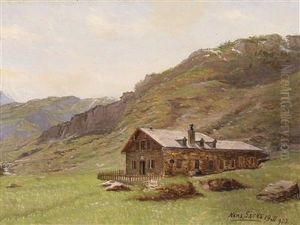Hans Sachs Paintings
Hans Sachs, born on November 5, 1494, in Nuremberg, Holy Roman Empire, was a German Meistersinger ('master singer'), poet, playwright, and shoemaker. His life and work are reflective of the burgeoning spirit of the Renaissance and Reformation in Germany, a period that saw a flowering of culture, thought, and the arts. Sachs is often revered for his contribution to German literature and for his role as one of the most prolific and versatile writers of his time. Sachs completed an apprenticeship as a shoemaker before embarking on a series of travels as a journeyman, which was customary at the time. These travels exposed him to various cultural influences and broadened his horizons, contributing to his development as a poet and songwriter. In 1513, he returned to Nuremberg, where he would spend the remainder of his life. He became a master shoemaker in 1519 and soon after joined the Meistersingers, a guild of amateur poets and musicians who were influential in the development of German secular music and poetry. Throughout his life, Hans Sachs wrote an astonishing number of works, with estimates ranging from 4,000 to 6,000 pieces, including plays, songs, and poems. His works covered a wide range of themes, from humorous tales and moral fables to adaptations of biblical stories and contemporary events. Sachs's writing was characterized by its accessibility, wit, and moral earnestness, qualities that made him immensely popular in his own time and beloved in German culture ever since. Sachs's legacy is not only in his voluminous works but also in his embodiment of the Renaissance man—deeply rooted in his own craft yet profoundly engaged with the world of ideas and the arts. He played a significant role in the Meistersinger tradition, which sought to preserve and foster a German cultural identity through music and poetry. Hans Sachs died on January 19, 1576, in Nuremberg, leaving behind a body of work that continues to be celebrated for its historical significance and its insight into the human condition. His life and work have inspired various cultural depictions, most notably in Richard Wagner's opera 'Die Meistersinger von Nürnberg' (The Master-Singers of Nuremberg), which portrays him as a wise and nurturing figure in the arts. Despite the passage of centuries, Hans Sachs remains a symbol of the rich cultural heritage of Nuremberg and a towering figure in the history of German literature and music.

